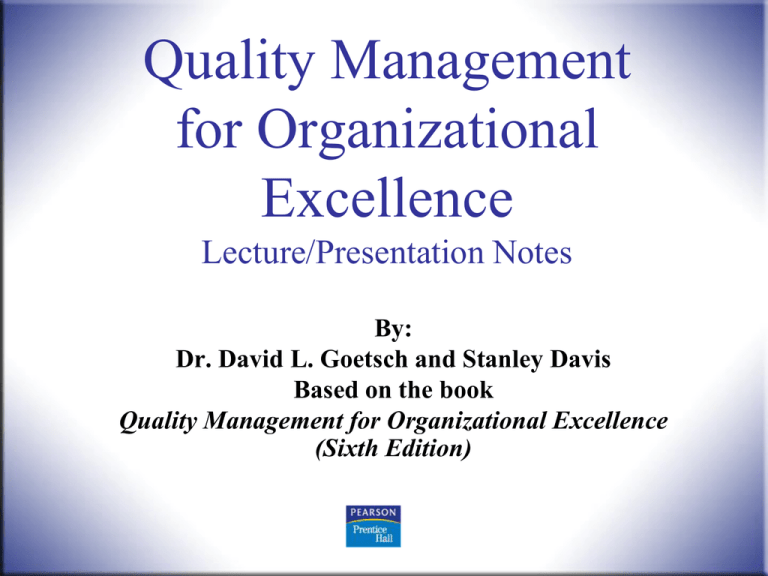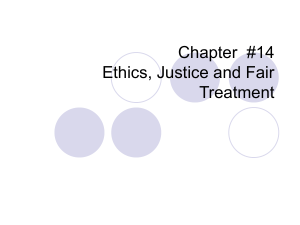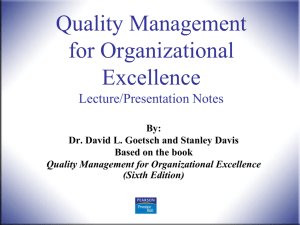
Quality Management
for Organizational
Excellence
Lecture/Presentation Notes
By:
Dr. David L. Goetsch and Stanley Davis
Based on the book
Quality Management for Organizational Excellence
(Sixth Edition)
Quality Management, 6th ed.
Goetsch and Davis
1
© 2010 Pearson Higher Education,
Upper Saddle River, NJ 07458. • All Rights Reserved.
Four:
Quality Management, Ethics, and
Corporate Social Responsibility
MAJOR TOPICS
Definition and Overview of Ethics
Trust and Total Quality
Values and Total Quality
Integrity and Total Quality
Responsibility and Total Quality
Manager’s Role in Ethics
Organization’s Role in Ethics
Quality Management, 6th ed.
Goetsch and Davis
2
© 2010 Pearson Higher Education,
Upper Saddle River, NJ 07458. • All Rights Reserved.
Four:
Quality Management, Ethics, and Corporate Social
Responsibility
(Continued)
Handling Ethical Dilemmas
Ethics Training and Codes of Business
Conduct
Models for Making Ethical Decisions
Beliefs versus Behavior: Why the Disparity?
Ethical Dilemmas: Cases
Corporate Social Responsibility Defined
Quality Management, 6th ed.
Goetsch and Davis
3
© 2010 Pearson Higher Education,
Upper Saddle River, NJ 07458. • All Rights Reserved.
Four:
Quality Management, Ethics, and Corporate Social
Responsibility
(Continued)
Ethics is about doing the right thing within a
moral framework. The most common
impediment to ethical conduct is human
nature because people tend to behave
according to perceived personal interest.
Quality Management, 6th ed.
Goetsch and Davis
4
© 2010 Pearson Higher Education,
Upper Saddle River, NJ 07458. • All Rights Reserved.
Four:
Quality Management, Ethics, and Corporate Social
Responsibility
(Continued)
Trust is a critical element of ethics, which, in turn,
makes ethics critical in total quality. Many of the
fundamental elements of total quality depend on trust
and ethical behavior, including communication,
interpersonal relations, conflict management, problem
solving, teamwork, employee involvement and
empowerment, and customer focus. Trust can be built
by being loyal to those not present, keeping promises,
and sincerely apologizing when necessary.
Quality Management, 6th ed.
Goetsch and Davis
5
© 2010 Pearson Higher Education,
Upper Saddle River, NJ 07458. • All Rights Reserved.
Four:
Quality Management, Ethics, and Corporate Social
Responsibility
(Continued)
Values are those core beliefs that guide our behavior.
Integrity requires honesty, but it is more than just
Individuals and organizations apply their knowledge and
skills most willingly to efforts in which they believe.
Managers should work to establish an environment in
which values that lead to ethical behavior and values
that lead to peak performance are the same.
honest. Integrity is a combination of honesty and
dependability. People with integrity can be counted on
to do the right thing, do it correctly, and do it on time.
Quality Management, 6th ed.
Goetsch and Davis
6
© 2010 Pearson Higher Education,
Upper Saddle River, NJ 07458. • All Rights Reserved.
Four:
Quality Management, Ethics, and Corporate Social
Responsibility
(Continued)
Accepting responsibility is part of ethical behavior. People
who pass blame are not behaving ethically. In a total
quality setting, people are responsible for their
performance. When speaking of their organization,
ethical people say, “we” instead of “they.”
Managers play a key role in ethics in an organization.
They are responsible for setting an example of ethical
behavior, helping employees make ethical choices, and
helping employees follow through and behave ethically
after making an ethical choice. In carrying out these
responsibilities, managers can use the best-ratio
approach, black-and-white approach, and full-potential
approach.
Quality Management, 6th ed.
Goetsch and Davis
7
© 2010 Pearson Higher Education,
Upper Saddle River, NJ 07458. • All Rights Reserved.
Four:
Quality Management, Ethics, and Corporate Social
Responsibility
(Continued)
The organization’s role in fostering ethical behavior
includes creating an ethical environment and setting an
ethical example. Key in creating an ethical environment is
having a comprehensive ethics policy. Key in setting an
example is following the policy, expecting all employees
to follow the policy, and rewarding those who do.
In handling ethical dilemmas, managers should select the
option that is most likely to build trust, integrity, and a
sense of responsibility and that is most likely to pass the
various ethics tests (i.e., front-page, morning-after, etc.).
Quality Management, 6th ed.
Goetsch and Davis
8
© 2010 Pearson Higher Education,
Upper Saddle River, NJ 07458. • All Rights Reserved.
Four:
Quality Management, Ethics, and Corporate Social
Responsibility
(Continued)
People who believe in ethical values will sometimes make
unethical decisions because of self-interest, selfprotection, conflicting values, or because they see the
benefits as being intangible or deferred.
Key elements of corporate social responsibility include
the ethical aspects of the following issues: human rights,
safety and health, business practice, governance,
environmental engagement, consumer relations,
marketplace activities, community involvement and social
development.
Quality Management, 6th ed.
Goetsch and Davis
9
© 2010 Pearson Higher Education,
Upper Saddle River, NJ 07458. • All Rights Reserved.












